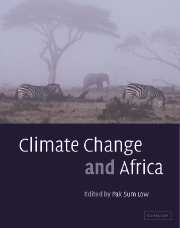Book contents
- Frontmatter
- Contents
- Notes on contributors
- Peer reviewers
- Editor's note
- Foreword
- Foreword
- Foreword
- Foreword
- Preface
- Preface
- Preface
- Preface
- List of abbreviations
- List of SI prefixes
- List of unit abbreviations
- List of chemical formulae
- Part I Science
- Part II Sustainable energy development, mitigation and policy
- Part III Vulnerability and adaptation
- Part IV Capacity-building
- Part V Lessons from the Montreal Protocol
- 29 Lessons for developing countries from the ozone agreements
- 30 Opportunities for Africa to integrate climate protection in economic development policy
- 31 Ozone depletion and global climate change: is the Montreal Protocol a good model for responding to climate change?
- Index
30 - Opportunities for Africa to integrate climate protection in economic development policy
Published online by Cambridge University Press: 10 December 2009
- Frontmatter
- Contents
- Notes on contributors
- Peer reviewers
- Editor's note
- Foreword
- Foreword
- Foreword
- Foreword
- Preface
- Preface
- Preface
- Preface
- List of abbreviations
- List of SI prefixes
- List of unit abbreviations
- List of chemical formulae
- Part I Science
- Part II Sustainable energy development, mitigation and policy
- Part III Vulnerability and adaptation
- Part IV Capacity-building
- Part V Lessons from the Montreal Protocol
- 29 Lessons for developing countries from the ozone agreements
- 30 Opportunities for Africa to integrate climate protection in economic development policy
- 31 Ozone depletion and global climate change: is the Montreal Protocol a good model for responding to climate change?
- Index
Summary
Keywords
Climate change; ozone protection; environment; business opportunities; economic development; Montreal Protocol; Kyoto Protocol; sustainable development; corporate leadership; technology cooperation; sustained financing
Abstarct
Protection of the environment is increasingly recognized as a prerequisite to economic development because a healthy workforce and sustainable access to natural resources are the foundation of any economy. Protection of the stratospheric ozone layer is being accomplished by diplomacy, corporate leadership, technology cooperation and financing. African and other developing countries can apply lessons from ozone layer protection to address climate change. Economically successful strategies can be developed for international diplomacy, domestic regulation, corporate leadership, consultancy, financing and technology development and adaptation.
INTRODUCTION
Africa and other developing countries face daunting challenges to simultaneously increase the standard of living and to protect the global and local environment. It is increasingly recognized that protection of the environment is a prerequisite to economic development because a healthy workforce and sustainable access to natural resources are the foundation of any economy. Many of the multinational companies most important to national economic development have environmental policies that give priority to investments in countries most able to support sustainable development.
Climate protection is particularly important to African countries because they will be among the first to experience the consequences of climate change (droughts, floods and sea-level rise), and will be among the least financially able to mitigate the damage.
- Type
- Chapter
- Information
- Climate Change and Africa , pp. 326 - 330Publisher: Cambridge University PressPrint publication year: 2005



